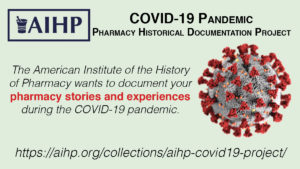This post is from Points, the joint blog of AIHP and the Alcohol and Drugs History Society. Points publishes original reflections about the history of drugs, medicines, alcohol, pharmacy, and their allied fields.
“The face of the nation’s opioid epidemic increasingly is gray and wrinkled,” wrote The Washington Post in 2018, “but that face often is overlooked in a crisis that frequently focuses on the young.” Since the early 2000s, medical experts have grown alarmed by the precipitous rise in opioid-related hospitalizations and deaths among the elderly and deeply concerned that the burgeoning crisis among the geriatric population was going unnoticed.
They pointed to several factors to explain the phenomenon but primarily blamed polypharmacy—the practice of prescribing patients multiple, often dozens of, medications—for the dramatic increase in addiction rates. “An increasing number of elderly patients nationwide are on multiple medications to treat chronic diseases,” one specialist claimed, “raising their chances of dangerous drug interactions and serious side effects. Often the drugs are prescribed by different specialists who don’t communicate with each other.” Older Americans are essentially being pharmaceuticalized, medicated to death, or, at the very least, subjected to extreme distress.
Narrative Medicine
Overprescribing, as the Washington Post article noted, often results from a fractured medical community that impedes the type of collaboration and communication between practitioners necessary for providing integrated regimens tailored for specific patients. Instead of individualized care, elderly patients often receive standardized treatments, that emphasize the use of pharmaceuticals to alleviate chronic pain.
To better serve their patients, physicians need to listen more intently and more empathetically to fully understand the causes of their distress. In other words, they need to practice what Dr. Rita Charon, Professor of Medicine at Columbia University’s Irving Medical Center, has called “narrative medicine.”
By asking pointed questions about both mental and physical health, practitioners can prompt patients to explain their suffering and to situate their pain in narratives and stories that help foster more thoughtful patient-doctor relationships and, consequently, provide intimate and targeted care. Charon writes that:
“With narrative competence, physicians can reach and join their patients in illness, recognize their own personal journeys through medicine, acknowledge kinship with and duties toward other health care professionals, and inaugurate consequential discourse with the public about health care. By bridging the divides that separate physicians from patients, themselves, colleagues, and society, narrative medicine offers fresh opportunities for respectful, empathic, and nourishing medical care.”
Please click the read more button below to see the rest of this post on Points by Contributing Editor Michael Brownrigg.



 The American Institute of the History of Pharmacy is documenting and preserving pharmacy stories and experiences during the COVID-19 global pandemic for the benefit of future historians and scholars. We seek to record the effects of this public health emergency on all types of pharmacy experiences. We invite you to share your pharmacy stories, photos, videos, artifacts, and other documentation of the COVID-19 coronavirus pandemic.
The American Institute of the History of Pharmacy is documenting and preserving pharmacy stories and experiences during the COVID-19 global pandemic for the benefit of future historians and scholars. We seek to record the effects of this public health emergency on all types of pharmacy experiences. We invite you to share your pharmacy stories, photos, videos, artifacts, and other documentation of the COVID-19 coronavirus pandemic.